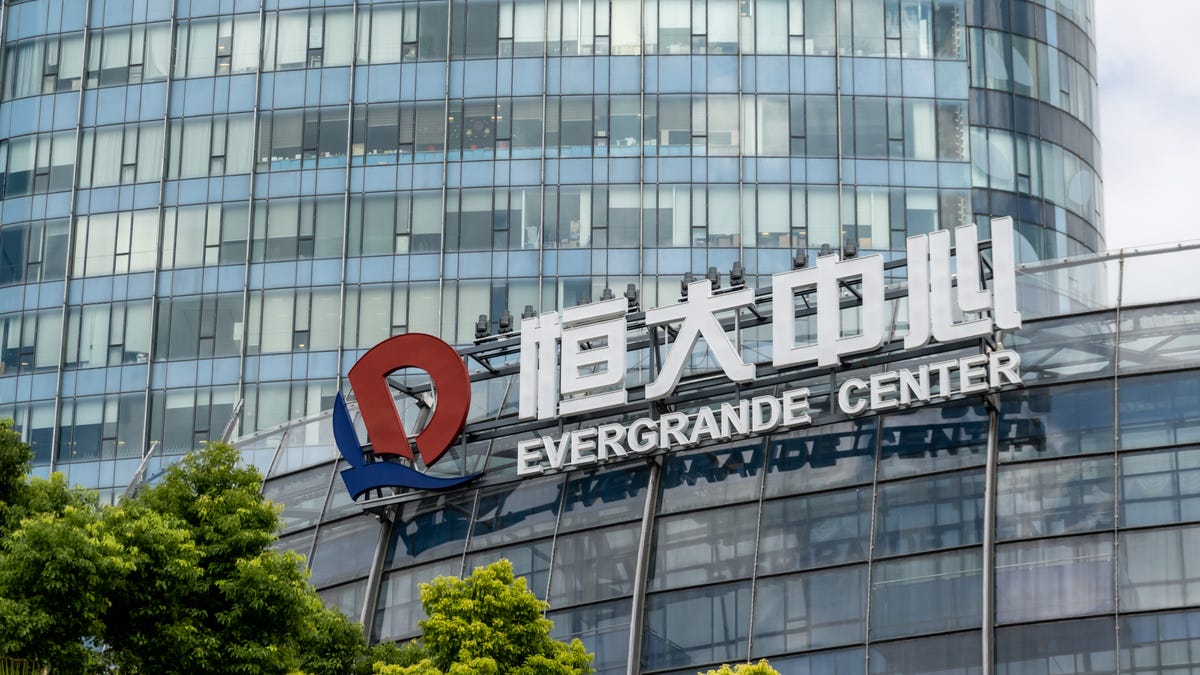What is Evergrande? China's potential debt crisis explained
Evergrande is a Chinese real estate giant with more than $300 billion in debt. It may default, which would impact countries everywhere.

Unless you follow China's economy, you probably had never heard about Evergrande until sometime this past week. (And no, it's not the ship that got stuck in Egypt's Suez Canal -- that was the Ever Given.) Evergrande is a real estate developer in China, and it also has its own soccer team and bottled-water business. Most importantly, after years of heavy borrowing, the company last week said it may default on its debt.
With over $300 billion in liabilities, Evergrande is the most indebted real estate company in the world. For comparison, Russia's state debt in 2020 was $257 billion. If the company goes bust, it could dramatically impact China's entire economy. Since China is a major trading partner for most countries around the world, economic problems within the country could reverberate widely.
Here's what you need to know about Evergrande, and why it's being compared to the US' Lehman Brothers bankruptcy.
What's Evergrande's issue?
Evergrande, which last year generated $77 billion in revenue, has two repayments due in the coming weeks. First, an $83 million interest payment due Thursday, according to Reuters, and another repayment, for a different bond, is due Sept. 29. That second one is reportedly for $47.5 million.
On Sept. 14, Evergrande told its investors that it may be unable to fulfill these obligations.
"September is typically when real estate companies in China record higher contract sales of properties," a letter to investors reads, before adding that Evergrande "expects significant continuing decline in contract sales in September, thereby resulting in the continuous deterioration of cash collection by the Group which would in turn place tremendous pressure on the Group's cashflow and liquidity."
As a result, the company said it may not be able to meet its upcoming financial obligations.
Evergrande owns assets in many sectors, not just real estate. It has an electric vehicle company, a soccer team and a bottled water business, among others. The company has sold some assets related to these investments, but not enough to cover the debt repayments.
Evergrande was contacted for comment but did not reply. In a statement to employees, company chairman Hui Ka Yuan reportedly said: "I firmly believe that with your concerted effort and hard work, Energrande will walk out of its darkest moment, resume full-scale constructions as soon as possible and achieve the pivotal target of delivering the property projects as pledged."
Is the government going to help?
No one is sure yet, but there are a few signs the state won't rescue Evergrande.
First, recent comments by the editor-in-chief of the Global Times, a state-controlled publication often viewed as the Chinese Communist Party's mouthpiece. "Once the problem explodes, the enterprise cannot have the fluke of being 'too big to fail,'" he wrote on WeChat. "They must have the ability to save themselves."
"Blind expansion, reckless financial manipulation, and high leverage are all adventures that require smooth wind and luck," he added. "Evergrande stretched the rubber band too tightly."
Aware of how much debt that companies in the real-estate sector were amassing, China last year developed a system to curb perilous borrowing, dubbed the "three red lines," under which property developers since last August have had to ensure a liability-to-asset ratio of under 70%, a net gearing ratio of less than 100% and a cash-to-short-term debt ratio of at least one. Failing on the wrong side of these lines, companies like Evergrande would be restricted from borrowing more money.
The message to real estate developers was clear: It's up to you to get your act together.
Still, there are signs that China's authorities will give Evergrande some breathing room. Rather than buy its debts, authorities have approved an Evergrande proposal to restructure its debts, reports Bloomberg, which would involve extending deadlines for payments.
Aggrieved home buyers, suppliers and employees gathered at Evergrande offices around China last week.
Is this like China's version of the global financial crisis?
Yes and no. (Mostly no.)
It is in the sense that the aftershocks of an Evergrande collapse, with its massive debt, would be felt in industries around the world. But analysts don't expect the impact to be as ruinous as the global financial crisis circa 2008, which developed when subprime mortgage debt was repackaged and sold to financial institutions in many countries. Most (but not all) of Evergrande's debt is held by creditors within China.
"We believe Beijing would only be compelled to step in if there is a far-reaching contagion causing multiple major developers to fail and posing systemic risks to the economy," a Sept. 20 S&P report reads. "Evergrande failing alone would unlikely result in such a scenario."
However, destabilized property markets are usually accompanied by suppressed consumer spending. If Evergrande collapses, Chinese demand for international products, commodities and services would potentially fall. That would affect markets everywhere, since China is a major trading partner for over 100 countries around the world. US exports to China were worth $124 billion in 2020.
What's the fallout been so far?
The reaction within China has been fierce. Evergrande has committed to building between 1.3 million and 1.6 million homes, according to different estimates, and earlier this year asked for loans from employees, as reported by The New York Times, which it now looks unlikely to be able to pay back. Protests have broken out in front of Evergrande offices around China, and at its headquarters in Shenzen. Employees, suppliers and customers who have paid for homes that have yet to be built were among those who demonstrated.
Though the company has yet to officially default, world markets have braced themselves. The S&P Index, the Nasdaq, Japan's Nikkei 225 and Australia's ASX are among the many markets that fell in the past 24 hours ahead of potential Evergrande trouble.

